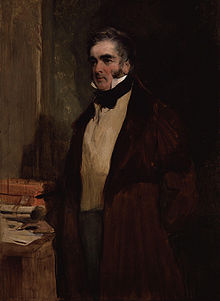The Whig government of the United Kingdom of Great Britain and Ireland that began in November 1830 and ended in November 1834 consisted of two ministries: the Grey ministry (from 1830 to July 1834) and then the first Melbourne ministry.
History
editThe first wholly Whig government since 1783 came to power after the Duke of Wellington's Tory government lost a vote of no confidence on 15 November 1830. The government, led by the Earl Grey, passed the Great Reform Act in 1832, which brought about parliamentary reform, and enacted the Slavery Abolition Act 1833, bringing about the abolition of slavery in most of the British Empire.[citation needed]
However, King William IV dismissed Grey's successor Lord Melbourne in 1834 and asked Sir Robert Peel to form a government. Peel was out of the country at the time, so the Duke of Wellington formed a caretaker government.[citation needed]
Cabinets
editThe Earl Grey's Cabinet, November 1830 – July 1834
editThe Viscount Melbourne's Cabinet, July 1834 – November 1834
editList of ministers
editMembers of the Cabinet are indicated by bold face.
- Notes
- ^ The Government resigned 8 May 1832 and resumed 17 May 1832.
- ^ Also Leader of the House of Commons until 1834.
- ^ Created Earl of Durham 23 March 1833.
- ^ a b Joint Secretary from 22 April 1834.
- ^ Entered the Cabinet 16 June 1831.
- ^ Entered the Cabinet 16 June 1831; also Leader of the House of Commons 1834.
- ^ entered the Cabinet 20 June 1834.
- ^ Office renamed Captain of the Gentlemen-at-Arms 17 March 1834.
- ^ Created Earl of Lichfield 15 September 1831.
References
edit- C. Cook and B. Keith, British Historical Facts 1830–1900

